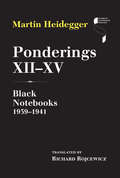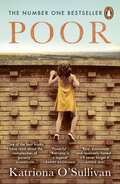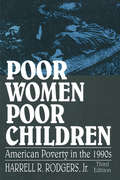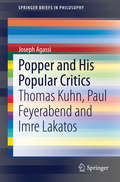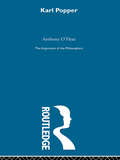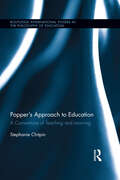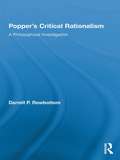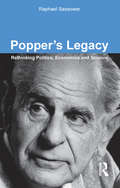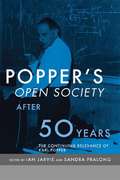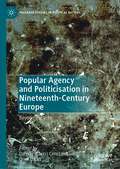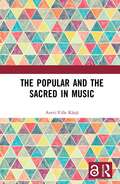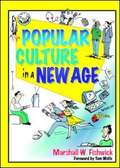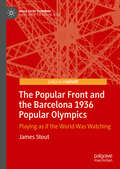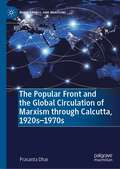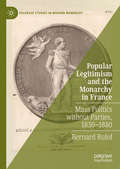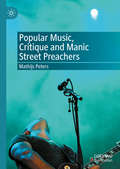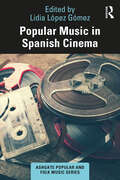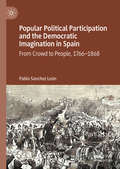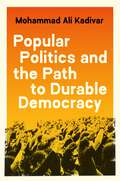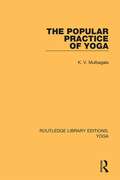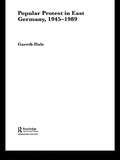- Table View
- List View
Ponderings XII–XV: Black Notebooks 1939–1941
by Martin Heidegger Richard RojcewiczPonderings XII–XV is third in a series of four "Black Notebooks" which Martin Heidegger composed in the early years of World War II. As always with Heidegger, the thoughts expressed here are not superficial reflections on current events, but instead penetrate deeply into them in order to contemplate their historical importance. Throughout his ponderings, Heidegger meditates on the call for an antidote to the rampant technological attitude which views all things with a dismissive consumer mentality. Although this volume caused quite a scandal when originally published in German due to references to World-Judaism, English readers with access to the full text can now judge for themselves what Heidegger means in his use of that term. In style, this notebook is less aphoristic and more sustained than the previous ones, but remains probing, challenging, and fascinating.
Poor: Grit, courage, and the life-changing value of self-belief
by Katriona O'SullivanThe No. 1 BestsellerBiography of the Year, Irish Book Awards 2023The Last Word Listeners' Choice Award, Irish Book Awards 2023'One of the best [books] I have read about the complexities of poverty . . . one of the most remarkable people you will ever meet' GuardianLike young girls everywhere Katriona O’Sullivan grew up bright, enthusiastic, curious. But she was also surrounded by abject poverty and chaos, and after she became pregnant and homeless at 15, what followed was five years of barely surviving. Yet today Katriona is an award-winning academic whose work explores barriers to education for girls like her.What set Katriona on this unexpected path were the mentors and supporters who truly saw her. The teachers who showed her how to wash in the school toilets or turned up at her door to convince her to sit at least one GCSE. The community worker who encouraged her to apply for training schemes. The friend who introduced Katriona to Trinity College’s access program while she was a cleaner. Simple acts that would help her turn her life around.Told with warmth, clarity and compassion – compassion for her parents, for her younger self, for others – Poor is both an astonishing personal testimony and an impassioned plea for the future of our children. ‘Powerful – Katriona is a legend’ Barry Keoghan‘Raw, passionate and resolutely honest – I’ll never forget it’ Annie Mac'Full of insight . . . so important' Fi Glover, Times Radio 'I read poor in one sitting I found it so compelling . . . moving, uplifting, brave, heroic' Nuala McGovern, Woman's Hour, BBC Radio Four'Moving, funny, brave and original - just like the author . . . absolutely incredible' Roísín Ingle, Irish Times Women's Podcast‘One of the books of the year’ Patrick Kielty, Late Late Show, RTÉ One'One of the most important books I have ever read … a beautiful telling of determination despite the odds' Lynn Ruane, Irish Times 'Fearless, funny and searingly honest' Adil Ray OBE'Raw and remarkable' Irish Independent 'A book of empowerment and hope' Patricia Scanlan ‘Remarkable . . . a vivid retelling of Katriona flourishing, despite her beginnings’ BBC News West Midlands
Poor Women, Poor Children: American Poverty in the 1990s
by RodgersThis work presents the most recent data on poverty, family structure and participation in welfare programmes. It analyses the causes for the continuing rise in female-headed households, the high rates of poverty among such families, and evaluates past, present and future reform policies.
Popper and His Popular Critics
by Joseph AgassiThis volume examines Popper's philosophy by analyzing the criticism of his most popular critics: Thomas Kuhn, Paul Feyerabend and Imre Lakatos. They all followed his rejection of the traditional view of science as inductive. Starting from the assumption that Hume's criticism of induction is valid, the book explores the central criticism and objections that these three critics have raised Their objections have met with great success, are significant and deserve paraphrase. One also may consider them reasonable protests against Popper's high standards rather than fundamental criticisms of his philosophy The book starts out with a preliminary discussion of some central background material and essentials of Popper's philosophy. It ends with nutshell representations of the philosophies of Popper. Kuhn, Feyerabend and Lakatos. The middle section of the book presents the connection between these philosophers and explains what their central ideas consists of, what the critical arguments are, how they presented them, and how valid they are. In the process, the author claims that Popper's popular critics used against him arguments that he had invented (and answered) without saying so. They differ from him mainly in that they demanded of all criticism that it should be constructive: do not stop believing a refuted theory unless there is a better alternative to it. Popper hardly ever discussed belief, delegating its study to psychology proper; he usually discussed only objective knowledge, knowledge that is public and thus open to public scrutiny.
Popper-Arg Philosophers
by Anthony O'HearFirst Published in 1999. Routledge is an imprint of Taylor & Francis, an informa company.
Popper, Otto Selz, and the Rise of Evolutionary Epistemology
by Michel Ter HarkThis book demonstrates that Karl Popper's philosophy of science, with its emphasis on the method of trial and error, is largely based on the psychology of Otto Selz. Selz's theory of problem solving and scientific discovery laid the foundation for much of contemporary cognitive psychology. This original analysis covers Popper's early writings before he began his career as a philosopher.
Popper's Approach to Education: A Cornerstone of Teaching and Learning (Routledge International Studies in the Philosophy of Education #38)
by Stephanie ChitpinChallenging the theory of induction in teacher education, this book proposes a knowledge-building framework based on the critical rationalism of philosopher of science, Karl Popper. The Objective Knowledge Growth Framework developed in this book is designed to be an effective critical analysis framework for empowering teachers and schools to build and share professional knowledge. This book is essential reading for educational scholars, researchers, professionals, policymakers, and all those interested in exploring the application of Popperian philosophy to the field of education and re-envisioning educational practice.
Popper's Critical Rationalism: A Philosophical Investigation (Routledge Studies in the Philosophy of Science)
by Darrell RowbottomPopper’s Critical Rationalism presents Popper’s views on science, knowledge, and inquiry, and examines the significance and tenability of these in light of recent developments in philosophy of science, philosophy of probability, and epistemology. It develops a fresh and novel philosophical position on science, which employs key insights from Popper while rejecting other elements of his philosophy. Central theses include: Crucial questions about scientific method arise at the level of the group, rather than that of the individual. Although criticism is vital for science, dogmatism is important too. Belief in scientific theories is permissible even in the absence of evidence in their favour. The aim of science is to eliminate false theories. Critical rationalism can be understood as a form of virtue epistemology
Popper's Legacy: Rethinking Politics, Economics and Science
by Raphael SassowerThe work of Karl Popper has had extraordinary influence across the fields of scientific and social thought. Widely regarded as one of the greatest philosophers of science of the twentieth century, he was also a highly influential social and political philosopher, a proponent and defender of the "open society". "Popper's Legacy" examines Popper in the round, analysing in particular his moral and psychological insights. Once Popper's scientific legacy is couched in political and moral terms, it becomes apparent that his concern for individual autonomy does not come at the expense of institutional guidelines and social conventions. Instead, these guidelines turn out to be essential sanctions for individual freedom. Popper envisions the conduct of the scientific community as paralleling the conduct of any democratically established community. Critical rationality guides the words and actions of all participants and leadership can be replaced without violence. In presenting a critical overview, "Popper's Legacy" reveals the debt many intellectual movements - such as Marxism, feminism, and postmodernism - still owe to Popper.
Popper's Open Society After Fifty Years
by Ian Jarvie Sandra PralongPopper's Open Society After Fifty Years presents a coherent survey of the reception and influence of Karl Popper's masterpiece The Open Society and its Enemies over the fifty years since its publication in 1945, as well as applying some of its principles to the context of modern Eastern Europe.This unique volume contains papers by many of Popper's contemporaries and friends, including such luminaries as Ernst Gombrich, in his paper 'The Open Society and its Enemies: Remembering its Publication Fifty Years Ago'.
Popular Agency and Politicisation in Nineteenth-Century Europe: Beyond the Vote (Palgrave Studies in Political History)
by Diego Palacios Cerezales Oriol LujánThis book provides an entry point to the most cutting-edge lines of research on popular political mobilisation in Europe. It brings together leading scholars from Germany, France, Britain, the Netherlands and Spain. The chapters explore the connected dimensions of popular participation within different countries and across borders, covering the topics of iconoclasm, popular acclamations, street politics, associations, petitions and electoral agitation. Focusing on the role of disenfranchised citizens and women, this collection broadens the themes of traditional political historical research that has identified political participation with the right to vote and struggles for political inclusion, and brings a wide array of formal and informal political practices to the centre of nineteenth-century European life. A must-read for scholars, undergraduates, and graduate students wishing to explore multiple dimensions of the history of political engagement and politicisation.
The Popular and the Sacred in Music
by Antti-Ville KärjäMusic, as the form of art whose name derives from ancient myths, is often thought of as pure symbolic expression and associated with transcendence. Music is also a universal phenomenon and thus a profound marker of humanity. These features make music a sphere of activity where sacred and popular qualities intersect and amalgamate. In an era characterised by postsecular and postcolonial processes of religious change, re-enchantment and alternative spiritualities, the intersections of the popular and the sacred in music have become increasingly multifarious. In the book, the cultural dynamics at stake are approached by stressing the extended and multiple dimensions of the sacred and the popular, hence challenging conventional, taken-for-granted and rigid conceptualisations of both popular music and sacred music. At issue are the cultural politics of labelling music as either popular or sacred, and the disciplinary and theoretical implications of such labelling. Instead of focussing on specific genres of popular music or types of religious music, consideration centres on interrogating musical situations where a distinction between the popular and the sacred is misleading, futile and even impossible. The topic is discussed in relation to a diversity of belief systems and different repertoires of music, including classical, folk and jazz, by considering such themes as origin myths, autonomy, ingenuity and stardom, authenticity, moral ambiguity, subcultural sensibilities and political ideologies.
Popular Culture in a New Age
by Marshall William FishwickFishwick (interdisciplinary studies, American studies, and popular culture studies, Virginia Tech) offers observations on popular culture in view of the changes brought about by the information revolution and the digital divide. Coverage hops about to address issues such as the millennium; distinctions between folk, fake, and pop; sacred symbols; the cult of celebrity; war; postmodern pop; and the concept of the global village, among other topics. Includes a couple of contributions by graduate students with similar snappy, stream-of-consciousness approaches.
The Popular Front and the Barcelona 1936 Popular Olympics: Playing as if the World Was Watching (Mega Event Planning)
by James StoutThis book deals with the events leading up to the 1936 Popular Olympics which would have united the Popular Front in opposition to the Berlin Olympics. It also discusses the days after the outbreak of the Spanish Civil War which began on the same day the games were due to start. Using a variety of primary and secondary sources, the book traces the biographies of several Popular Olympians who would go on to volunteer in the Spanish Civil War. The book also examines the planned events and locations for the Popular Olympics as well as the international funding that the games secured. The book argues that the events were a departure from Workers’ Sport as well as the IOC’s Olympic games and represented an important cultural manifestation of the Popular Front.
The Popular Front and the Global Circulation of Marxism through Calcutta, 1920s-1970s (Marx, Engels, and Marxisms)
by Prasanta DharThis book examines the global circulation of Marxism seen from one of its most highly charged sites: Calcutta in India. Building on but also revising existing approaches to global intellectual history, the book presents the circulation of Marxism through Calcutta as a historically-sited problem of mass mediation. Using tools from media studies, the book explores the way that Marxism was presented to the public, the technologies used, and the meanings of Marxism in twentieth-century Calcutta. Demonstrating how the Popular Front was split between the so-called 'people's group' and those whom were called 'intellectuals', the book argues that the people's group generally identified themselves as Marxists and preferred audio-visual media such as theatre, while the so-called intellectuals privileged academic rigour and print media, usually referring to themselves as Marxians. Thus, the author reveals a polyphony of Marxisms in the Popular Front. Tracing Marxism back to the Bengal Renaissance and the Swadeshi and Naxal movements, this book shows how debate around the meaning of 'Marxism' continued throughout the 1970s in Calcutta, and eventually engendered the historiographical movement that has come to be known as Subaltern Studies.
Popular Lectures on Mathematical Logic
by Hao WangA noted logician and philosopher addresses various forms of mathematical logic, discussing both theoretical underpinnings and practical applications. Author Hao Wang surveys the central concepts and theories of the discipline in a historical and developmental context, and then focuses on the four principal domains of contemporary mathematical logic: set theory, model theory, recursion theory and constructivism, and proof theory.Topics include the place of problems in the development of theories of logic and logic's relation to computer science. Specific attention is given to Gödel's incompleteness theorems, predicate logic and its decision and reduction problems, constructibility and Cantor's continuum hypothesis, proof theory and Hilbert's program, hierarchies and unification, proof of the four-color problem, the Diophantine problem, the tautology problem, and many other subjects. Three helpful Appendixes conclude the text.
Popular Legitimism and the Monarchy in France: Mass Politics without Parties, 1830–1880 (Palgrave Studies in Modern Monarchy)
by Bernard RulofThis book explores mid-nineteenth-century French legitimism and the implications of popular support for a movement that has traditionally been portrayed as an aristocratic force intent on restoring the Old Regime. This type of monarchism has often been understood as a form of elitist patronage politics or, alternatively, identified with ultramontane Catholicism. Although historians have offered a more nuanced view in the last few decades, their work, nevertheless, has predominantly focused on legitimist leaders rather than their followers and their professed feelings of loyalty to monarchy and monarch. This book’s originality therefore is twofold: firstly as an analysis of popular rather than élite monarchism; and secondly, as a study which portrays this form of royalism as a political movement characteristic of a period which saw the emergence of mass politics, while parties were still non-existent. It not only discusses the social and cultural settings of (popular) monarchism, but also contributes to the history of political parties, citizenship and democracy.
Popular Morality in the Early Roman Empire
by Teresa MorganMorality is one of the fundamental structures of any society, enabling complex groups to form, negotiate their internal differences and persist through time. In the first book-length study of Roman popular morality, Dr Morgan argues that we can recover much of the moral thinking of people across the Empire. Her study draws on proverbs, fables, exemplary stories and gnomic quotations, to explore how morality worked as a system for Roman society as a whole and in individual lives. She examines the range of ideas and practices and their relative importance, as well as questions of authority and the relationship with high philosophy and the ethical vocabulary of documents and inscriptions. The Roman Empire incorporated numerous overlapping groups, whose ideas varied according to social status, geography, gender and many other factors. Nevertheless it could and did hold together as an ethical community, which was a significant factor in its socio-political success.
Popular Music, Critique and Manic Street Preachers
by Mathijs PetersThis book explores the ways in which popular music can criticise political, social and economic structures, through the lens of alternate rock band Manic Street Preachers. Unlike most recent work on popular music, Peters concentrates largely on lyrical content to defend the provocative claim that the Welsh band pushes the critical message shaped in their lyrics to the forefront. Their music, this suggests, along with sleeve art, body-art, video-clips, clothes, interviews and performances, serves to emphasise this critical message and the primary role played by the band’s lyrics. Blending the disciplines of popular music studies, culture studies and philosophy, Peters confronts the ideas of German philosopher and social critic Theodor W. Adorno with the entire catalogue of Manic Street Preachers, from their 1988 single ‘Suicide Alley’ to their 2018 album Resistance is Futile. Although Adorno argues that popular music is unable to resist the standardising machinery of consumption culture, Peters paradoxically uses his ideas to show that Manic Street Preachers releases shape ‘critical models’ with which to formulate social and political critique. This notion of the ‘critical model’ enables Peters to argue that the catalogue of Manic Street Preachers critically addresses a wide range of themes, from totalitarianism to Holocaust representation, postmodern temporality to Europeanism, and from Nietzsche’s ideas about self-overcoming to reflections on digimodernism and post-truth politics. The book therefore persuasively shows that Manic Street Preacher lyrics constitute an intertextual network of links between diverse cultural and political phenomena, encouraging listeners to critically reflect on the structures that shape our lives.
Popular Music in Spanish Cinema (Ashgate Popular and Folk Music Series)
by Lidia López GómezPopular Music in Spanish Cinema analyses the aesthetics and stylistic development of soundtracks from national productions, considering how political instability and cultural diversity in Spain determined the ways of making art and managing culture. As a pioneering study in this field, the chronologically structured approach of this book provides readers with a complete overview of Spanish music and connects it to the complex historical events that conditioned Spanish culture throughout the 20th century to the present day, from the Second Republic, the Spanish Civil war, and the dictatorship through to democracy. The book enables an understanding of the relationships between the recording and film production industries, the construction of collective imagination, the formulation of new stereotypes, semiotic meanings within film music and the musical exchanges between national and international cinema. This volume is an essential read for students and academics in the field of musicology, ethnomusicology and history as well as those interested in the study of diverse musical styles such as copla, zarzuela, flamenco, jazz, foxtrot, pop and rock and how they have been used in Spanish films throughout history.
Popular Political Participation and the Democratic Imagination in Spain: From Crowd to People, 1766-1868
by Pablo Sánchez LeónThis book addresses the changing relationships among political participation, political representation, and popular mobilization in Spain from the 1766 protest in Madrid against the early Bourbon reforms until the citizen revolution of 1868 that first introduced universal suffrage and led to the ousting of the monarchy. Popular Participation and the Democratic Imagination in Spain shows that a notion of the “crowd” internally dividing the concept of “people” existed before the advent of Liberalism, allowing for the enduring subordination of popular participation to representation in politics. In its wider European and colonial American context, the study analyzes semantic changes in a range of cultural spheres, from parliamentary debate to historical narrative and aesthetics. It shows how Liberalism had trouble reproducing the legitimacy of limited suffrage and traces the evolution of an imagination on democracy that would allow for the reconfiguration of an all-encompassing image of the people eventually overcoming representative government.“Focused on the nation and identities, Spanish historiography had a pending debt with that other historical subject of modernity, the people. With this book, Pablo Sánchez León starts cancelling the debt with an innovative methodology combining conceptual history with social and political history. Brilliantly, this books also proposes a novel chronology for modern history and renewed categories of analysis. In many senses, this is an extraordinarily renovating senior work.”—José María Portillo Valdés, University of the Basque Country, Spain “This book by Pablo Sánchez León is an original and detailed study of one of the essential components of modernity, the relation between the concepts of plebe and pueblo. The author shows that plebe and people were shaped in a process of mutual differentiation and how the enduring tension between them deeply marked out the evolution of Spanish politics from the end of the Old Regime and throughout the 19th century. As the author brilliantly argues, such tension is tightly imbricated with the enduring dilemma between representation and participation underlying modern political systems. Through a historical analysis of the influence of people and plebe over Spanish, the book makes clear the degree to which the power of language contributes to shape political actors and institutional frames.”—Miguel Ángel Cabrera — Professor, University of La Laguna, Tenerife, Spain “Most accounts of Spain’s transition to modern democracy begin with the popular uprising against the French invasion in 1808, the creation of a national parliament and the promulgation of an advanced Liberal constitution in 1812. Pablo Sánchez León begins the story half a century earlier in the mass street protests in Madrid and other cities in 1766 sparked by Charles III’s sweeping reform programme. Sánchez León focuses unrepentantly on plebeian groups and crowd action – how they are described and conceived by contemporaries – as a key to understanding Spain’s precocious and troubled passage from absolutism to the promulgation of universal male suffrage in September 1868. This audacious and highly original interpretation will surely strike a chord with students of modern Spain.”—Guy Thomson, University of Warwick, UK “This is a book for exploring (from current needs) the history of political participation in Spanish society in order to rethink the very notion of modern citizenship.”—María Sierra, University of Seville, Spain “Motivated by the current crisis in political representation in parliamentary democracies, this work by Pablo Sánchez León departs from the process of construction of modern citizenship. Representation, participation and mobilization are put into play as an interactive triad whose dynamics and changing conceptualization have the key to the social, political and cultural chang
Popular Politics and the Path to Durable Democracy (Princeton Studies In Global And Comparative Sociology Ser.)
by Mohammad Ali KadivarA groundbreaking account of how prolonged grassroots mobilization lays the foundations for durable democratizationWhen protests swept through the Middle East at the height of the Arab Spring, the world appeared to be on the verge of a wave of democratization. Yet with the failure of many of these uprisings, it has become clearer than ever that the path to democracy is strewn with obstacles. Mohammad Ali Kadivar examines the conditions leading to the success or failure of democratization, shedding vital new light on how prodemocracy mobilization affects the fate of new democracies.Drawing on a wealth of new evidence, Kadivar shows how the longest episodes of prodemocracy protest give rise to the most durable new democracies. He analyzes more than one hundred democratic transitions in eighty countries between 1950 and 2010, showing how more robust democracies emerge from lengthier periods of unarmed mobilization. Kadivar then analyzes five case studies—South Africa, Poland, Pakistan, Egypt, and Tunisia—to investigate the underlying mechanisms. He finds that organization building during the years of struggle develops the leadership needed for lasting democratization and strengthens civil society after dictatorship.Popular Politics and the Path to Durable Democracy challenges the prevailing wisdom in American foreign policy that democratization can be achieved through military or coercive interventions, revealing how lasting change arises from sustained, nonviolent grassroots mobilization.
The Popular Practice of Yoga (Routledge Library Editions: Yoga #6)
by K.V. MulbagalaThis book, first published in 1935, is an early western study of the practice of yoga. It examines the theories of yoga, and attempts to understand and explain its philosophy and beliefs.
Popular Protest in East Germany: Judgements On The Street (Routledge Advances in European Politics)
by Gareth DaleAn incisive new study of dissent and protest in the German Democratic Republic, focusing on the upheaval of 1989-1990. The author, an active participant both in the 'Citizens' Movement' and in the street protests of that year, draws upon a vast array of sources including interviews, documents from the archives of the old regime and the Citizens' Movement and his own diary entries, to explore the causes and processes of the East German revolution. The book is at once a lucid and vibrant narrative history and a pioneering contribution to research in this field.
Popular sovereignty in historical perspective
by Bourke, Richard and Skinner, Quentin Richard Bourke Quentin SkinnerThis collaborative volume offers the first historical reconstruction of the concept of popular sovereignty from antiquity to the twentieth century. First formulated between the late sixteenth and mid-seventeenth centuries, the various early modern conceptions of the doctrine were heavily indebted to Roman reflection on forms of government and Athenian ideas of popular power. This study, edited by Richard Bourke and Quentin Skinner, traces successive transformations of the doctrine, rather than narrating a linear development. It examines critical moments in the career of popular sovereignty, spanning antiquity, medieval Europe, the early modern wars of religion, the revolutions of the eighteenth century and their aftermath, decolonisation and mass democracy. Featuring original work by an international team of scholars, the book offers a reconsideration of one of the formative principles of contemporary politics by exploring its descent from classical city-states to the advent of the modern state.
